Nursing Reflection on Medication Error and Patient Safety
VerifiedAdded on 2022/10/10
|6
|1618
|67
Essay
AI Summary
This essay provides a comprehensive nursing reflection on a case involving a medication error that led to a patient's death. The essay begins with an introduction that outlines the incident, where a nurse administered three oral medications intravenously to an elderly patient, resulting in a fatal heart attack. The essay then delves into the details of the incident, discussing the nurse's actions and the patient's medical history. It highlights the importance of consulting with senior nurses or physicians before administering medications, emphasizing adherence to clinical practice guidelines. The essay further explores the consequences of such incidents, including the hazardous effects on the nurse's career, the erosion of patient trust, and the potential for medical negligence. It emphasizes the need for strict nursing care plans, continuous updates on medical information, and collaborative communication among healthcare professionals. The reflection utilizes Rolfe's reflective model to analyze the incident, expressing empathy for the nurse and underscoring the importance of safety guidelines. The essay concludes by reiterating the impact of medical negligence, highlighting the need for considering patient medical history and advocating for proper safety practices. The essay references various scholarly articles and publications to support its arguments and provide a well-rounded perspective on the issue.
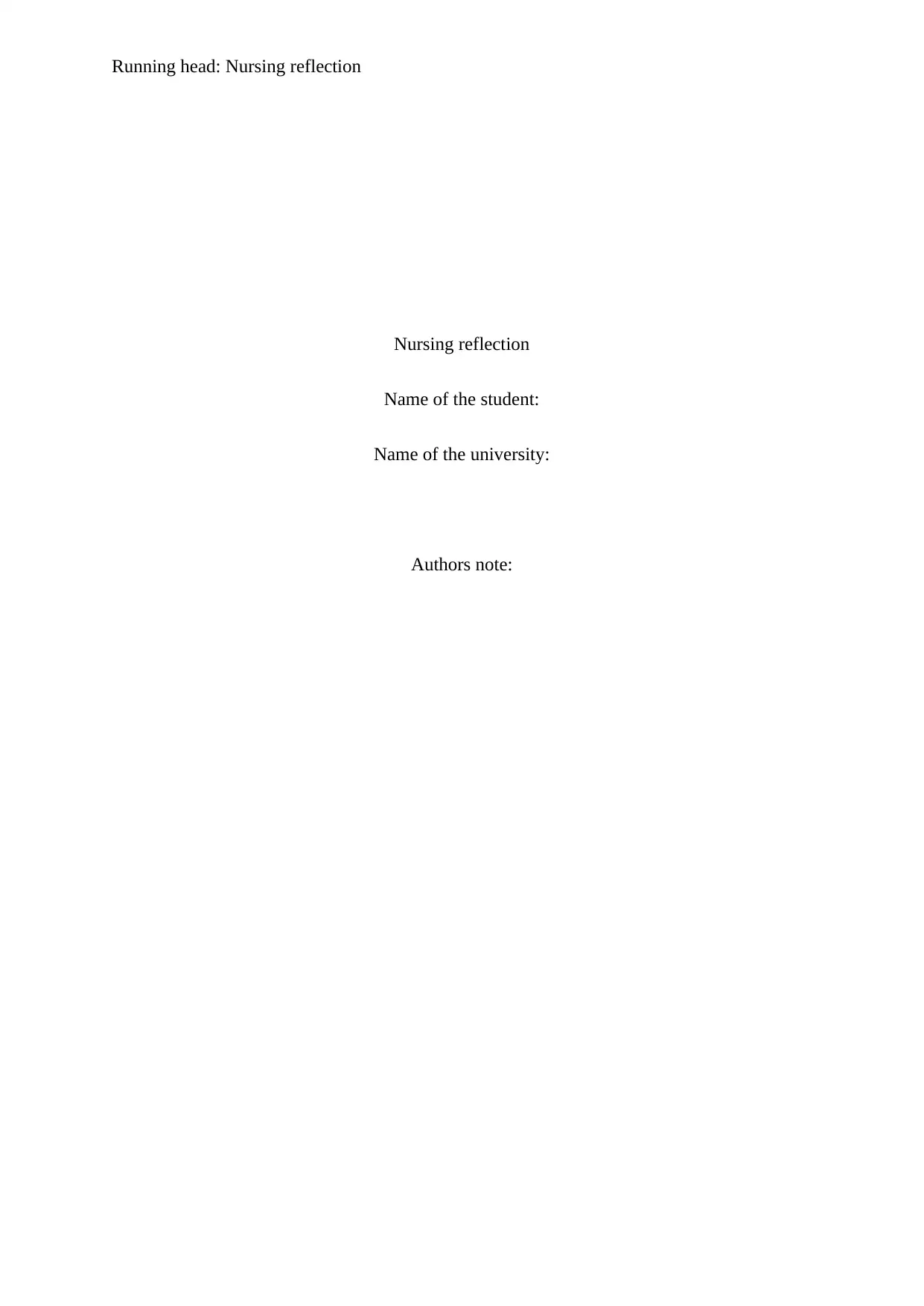
Running head: Nursing reflection
Nursing reflection
Name of the student:
Name of the university:
Authors note:
Nursing reflection
Name of the student:
Name of the university:
Authors note:
Paraphrase This Document
Need a fresh take? Get an instant paraphrase of this document with our AI Paraphraser
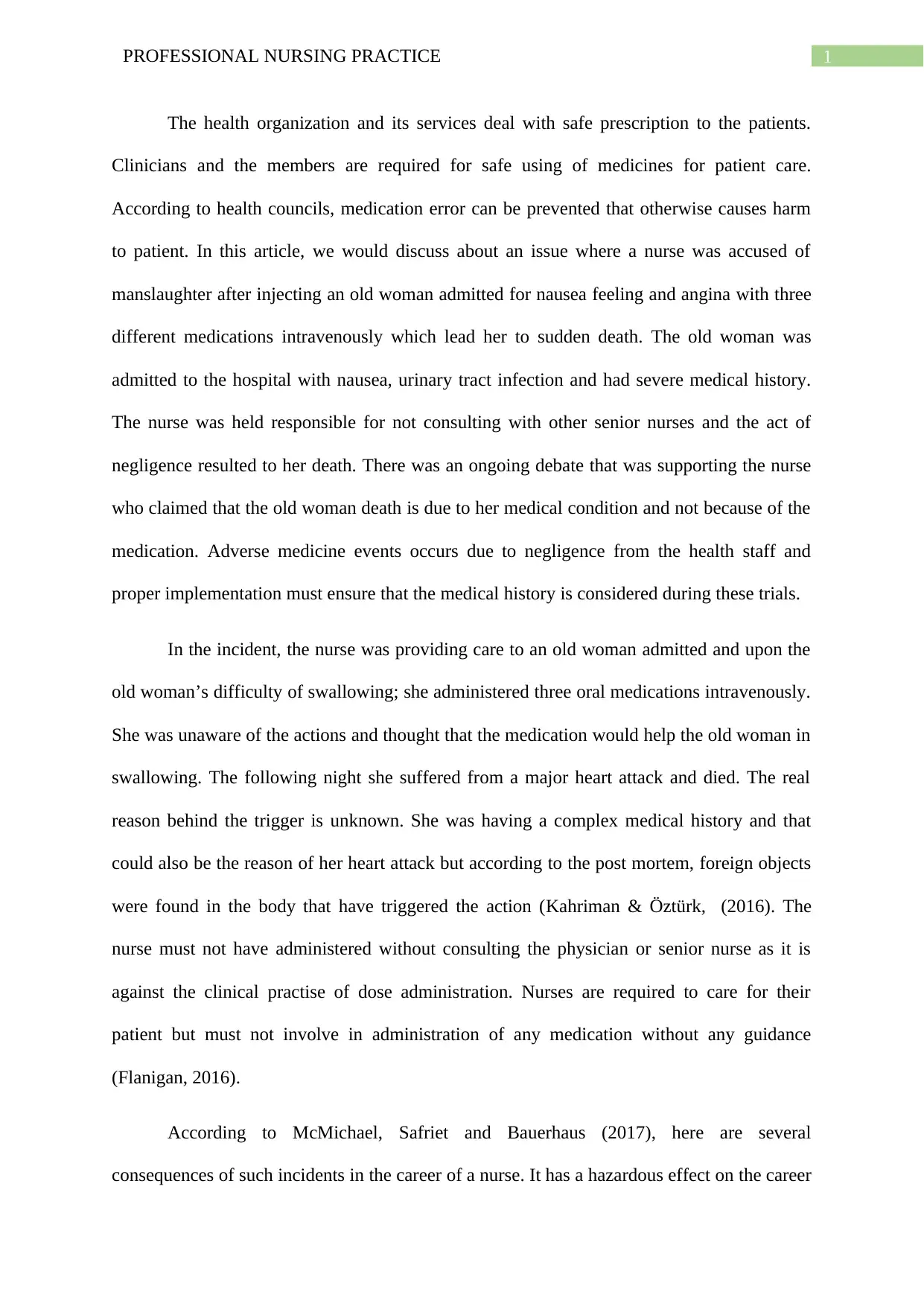
1PROFESSIONAL NURSING PRACTICE
The health organization and its services deal with safe prescription to the patients.
Clinicians and the members are required for safe using of medicines for patient care.
According to health councils, medication error can be prevented that otherwise causes harm
to patient. In this article, we would discuss about an issue where a nurse was accused of
manslaughter after injecting an old woman admitted for nausea feeling and angina with three
different medications intravenously which lead her to sudden death. The old woman was
admitted to the hospital with nausea, urinary tract infection and had severe medical history.
The nurse was held responsible for not consulting with other senior nurses and the act of
negligence resulted to her death. There was an ongoing debate that was supporting the nurse
who claimed that the old woman death is due to her medical condition and not because of the
medication. Adverse medicine events occurs due to negligence from the health staff and
proper implementation must ensure that the medical history is considered during these trials.
In the incident, the nurse was providing care to an old woman admitted and upon the
old woman’s difficulty of swallowing; she administered three oral medications intravenously.
She was unaware of the actions and thought that the medication would help the old woman in
swallowing. The following night she suffered from a major heart attack and died. The real
reason behind the trigger is unknown. She was having a complex medical history and that
could also be the reason of her heart attack but according to the post mortem, foreign objects
were found in the body that have triggered the action (Kahriman & Öztürk, (2016). The
nurse must not have administered without consulting the physician or senior nurse as it is
against the clinical practise of dose administration. Nurses are required to care for their
patient but must not involve in administration of any medication without any guidance
(Flanigan, 2016).
According to McMichael, Safriet and Bauerhaus (2017), here are several
consequences of such incidents in the career of a nurse. It has a hazardous effect on the career
The health organization and its services deal with safe prescription to the patients.
Clinicians and the members are required for safe using of medicines for patient care.
According to health councils, medication error can be prevented that otherwise causes harm
to patient. In this article, we would discuss about an issue where a nurse was accused of
manslaughter after injecting an old woman admitted for nausea feeling and angina with three
different medications intravenously which lead her to sudden death. The old woman was
admitted to the hospital with nausea, urinary tract infection and had severe medical history.
The nurse was held responsible for not consulting with other senior nurses and the act of
negligence resulted to her death. There was an ongoing debate that was supporting the nurse
who claimed that the old woman death is due to her medical condition and not because of the
medication. Adverse medicine events occurs due to negligence from the health staff and
proper implementation must ensure that the medical history is considered during these trials.
In the incident, the nurse was providing care to an old woman admitted and upon the
old woman’s difficulty of swallowing; she administered three oral medications intravenously.
She was unaware of the actions and thought that the medication would help the old woman in
swallowing. The following night she suffered from a major heart attack and died. The real
reason behind the trigger is unknown. She was having a complex medical history and that
could also be the reason of her heart attack but according to the post mortem, foreign objects
were found in the body that have triggered the action (Kahriman & Öztürk, (2016). The
nurse must not have administered without consulting the physician or senior nurse as it is
against the clinical practise of dose administration. Nurses are required to care for their
patient but must not involve in administration of any medication without any guidance
(Flanigan, 2016).
According to McMichael, Safriet and Bauerhaus (2017), here are several
consequences of such incidents in the career of a nurse. It has a hazardous effect on the career
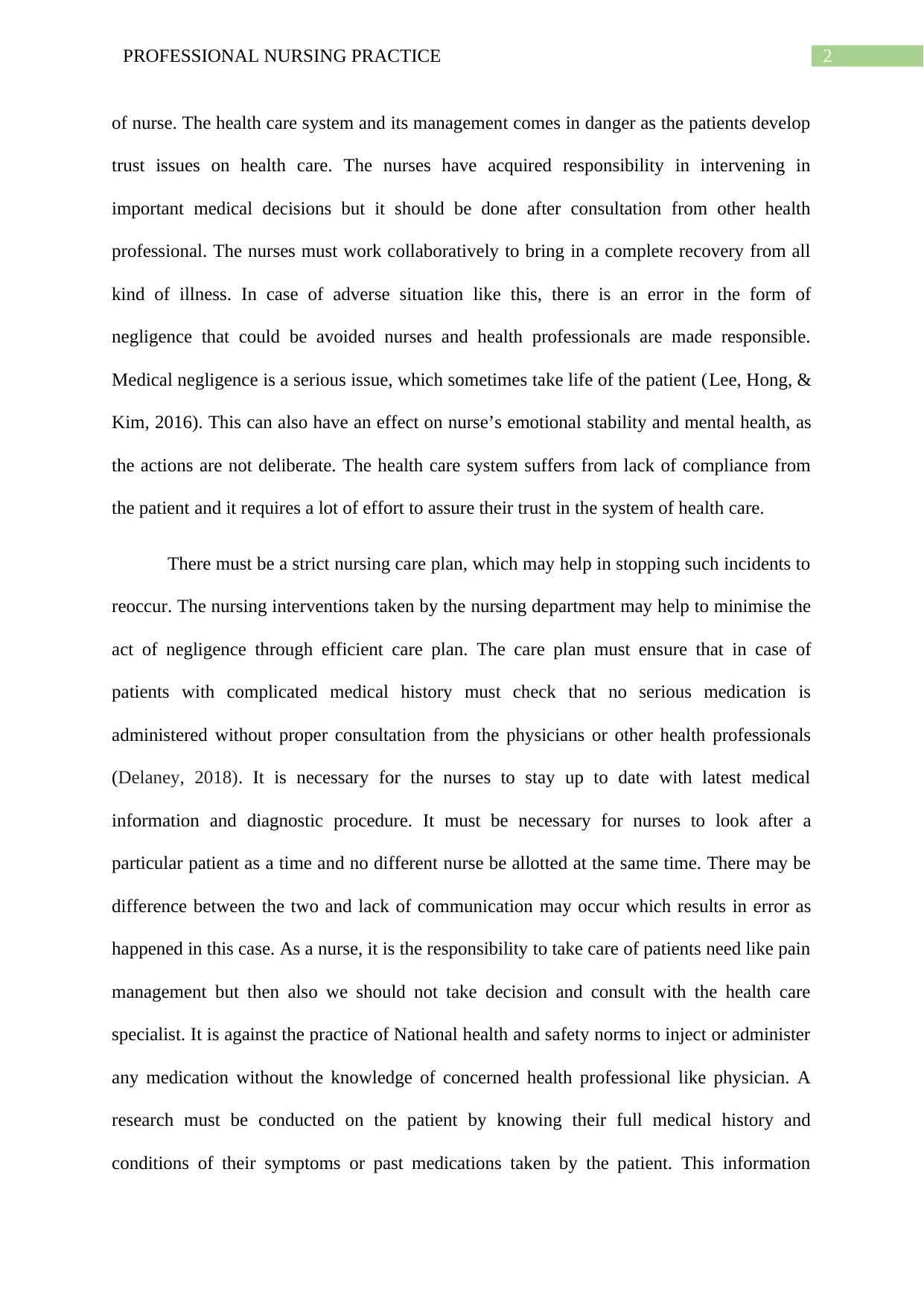
2PROFESSIONAL NURSING PRACTICE
of nurse. The health care system and its management comes in danger as the patients develop
trust issues on health care. The nurses have acquired responsibility in intervening in
important medical decisions but it should be done after consultation from other health
professional. The nurses must work collaboratively to bring in a complete recovery from all
kind of illness. In case of adverse situation like this, there is an error in the form of
negligence that could be avoided nurses and health professionals are made responsible.
Medical negligence is a serious issue, which sometimes take life of the patient (Lee, Hong, &
Kim, 2016). This can also have an effect on nurse’s emotional stability and mental health, as
the actions are not deliberate. The health care system suffers from lack of compliance from
the patient and it requires a lot of effort to assure their trust in the system of health care.
There must be a strict nursing care plan, which may help in stopping such incidents to
reoccur. The nursing interventions taken by the nursing department may help to minimise the
act of negligence through efficient care plan. The care plan must ensure that in case of
patients with complicated medical history must check that no serious medication is
administered without proper consultation from the physicians or other health professionals
(Delaney, 2018). It is necessary for the nurses to stay up to date with latest medical
information and diagnostic procedure. It must be necessary for nurses to look after a
particular patient as a time and no different nurse be allotted at the same time. There may be
difference between the two and lack of communication may occur which results in error as
happened in this case. As a nurse, it is the responsibility to take care of patients need like pain
management but then also we should not take decision and consult with the health care
specialist. It is against the practice of National health and safety norms to inject or administer
any medication without the knowledge of concerned health professional like physician. A
research must be conducted on the patient by knowing their full medical history and
conditions of their symptoms or past medications taken by the patient. This information
of nurse. The health care system and its management comes in danger as the patients develop
trust issues on health care. The nurses have acquired responsibility in intervening in
important medical decisions but it should be done after consultation from other health
professional. The nurses must work collaboratively to bring in a complete recovery from all
kind of illness. In case of adverse situation like this, there is an error in the form of
negligence that could be avoided nurses and health professionals are made responsible.
Medical negligence is a serious issue, which sometimes take life of the patient (Lee, Hong, &
Kim, 2016). This can also have an effect on nurse’s emotional stability and mental health, as
the actions are not deliberate. The health care system suffers from lack of compliance from
the patient and it requires a lot of effort to assure their trust in the system of health care.
There must be a strict nursing care plan, which may help in stopping such incidents to
reoccur. The nursing interventions taken by the nursing department may help to minimise the
act of negligence through efficient care plan. The care plan must ensure that in case of
patients with complicated medical history must check that no serious medication is
administered without proper consultation from the physicians or other health professionals
(Delaney, 2018). It is necessary for the nurses to stay up to date with latest medical
information and diagnostic procedure. It must be necessary for nurses to look after a
particular patient as a time and no different nurse be allotted at the same time. There may be
difference between the two and lack of communication may occur which results in error as
happened in this case. As a nurse, it is the responsibility to take care of patients need like pain
management but then also we should not take decision and consult with the health care
specialist. It is against the practice of National health and safety norms to inject or administer
any medication without the knowledge of concerned health professional like physician. A
research must be conducted on the patient by knowing their full medical history and
conditions of their symptoms or past medications taken by the patient. This information
⊘ This is a preview!⊘
Do you want full access?
Subscribe today to unlock all pages.

Trusted by 1+ million students worldwide
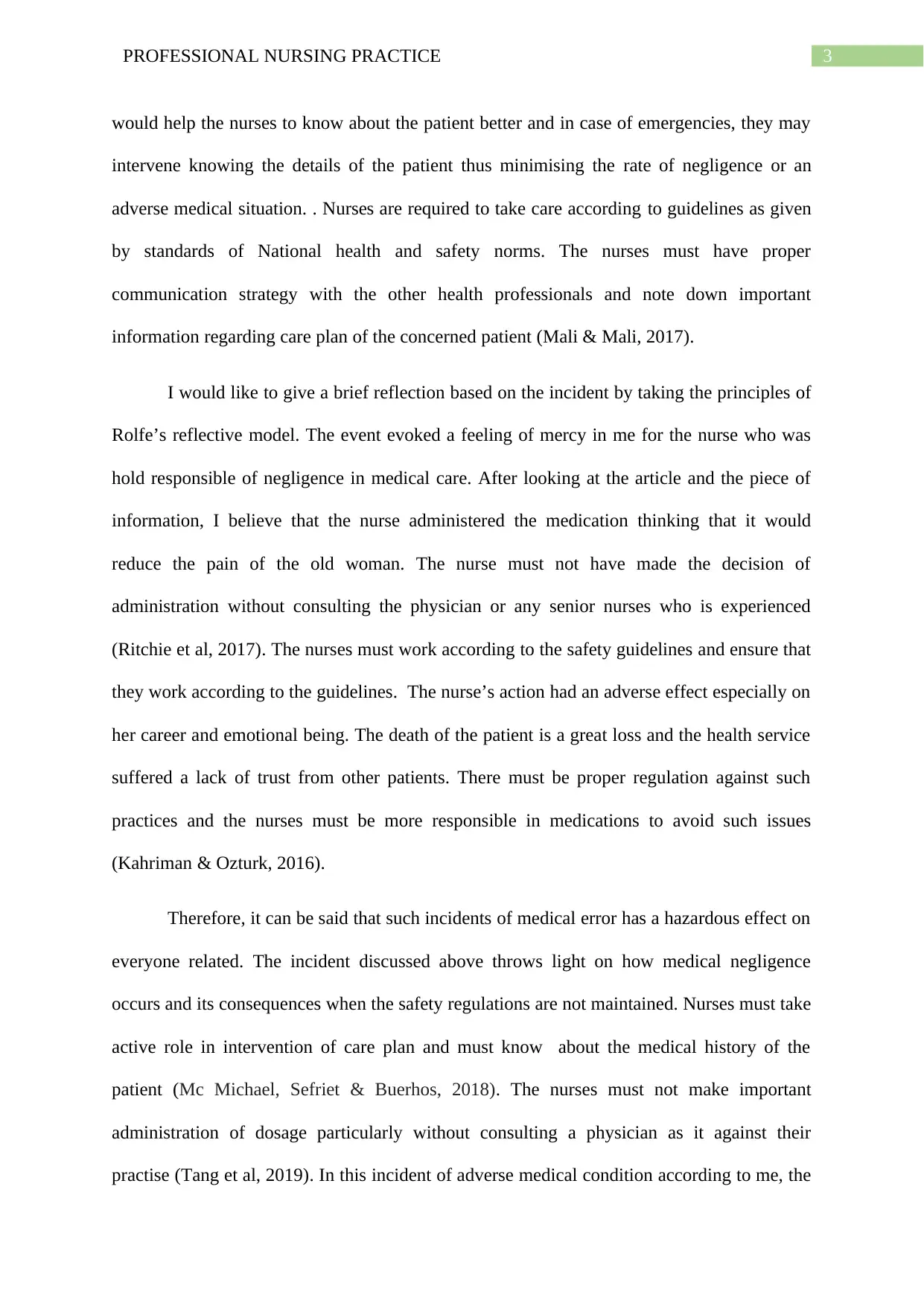
3PROFESSIONAL NURSING PRACTICE
would help the nurses to know about the patient better and in case of emergencies, they may
intervene knowing the details of the patient thus minimising the rate of negligence or an
adverse medical situation. . Nurses are required to take care according to guidelines as given
by standards of National health and safety norms. The nurses must have proper
communication strategy with the other health professionals and note down important
information regarding care plan of the concerned patient (Mali & Mali, 2017).
I would like to give a brief reflection based on the incident by taking the principles of
Rolfe’s reflective model. The event evoked a feeling of mercy in me for the nurse who was
hold responsible of negligence in medical care. After looking at the article and the piece of
information, I believe that the nurse administered the medication thinking that it would
reduce the pain of the old woman. The nurse must not have made the decision of
administration without consulting the physician or any senior nurses who is experienced
(Ritchie et al, 2017). The nurses must work according to the safety guidelines and ensure that
they work according to the guidelines. The nurse’s action had an adverse effect especially on
her career and emotional being. The death of the patient is a great loss and the health service
suffered a lack of trust from other patients. There must be proper regulation against such
practices and the nurses must be more responsible in medications to avoid such issues
(Kahriman & Ozturk, 2016).
Therefore, it can be said that such incidents of medical error has a hazardous effect on
everyone related. The incident discussed above throws light on how medical negligence
occurs and its consequences when the safety regulations are not maintained. Nurses must take
active role in intervention of care plan and must know about the medical history of the
patient (Mc Michael, Sefriet & Buerhos, 2018). The nurses must not make important
administration of dosage particularly without consulting a physician as it against their
practise (Tang et al, 2019). In this incident of adverse medical condition according to me, the
would help the nurses to know about the patient better and in case of emergencies, they may
intervene knowing the details of the patient thus minimising the rate of negligence or an
adverse medical situation. . Nurses are required to take care according to guidelines as given
by standards of National health and safety norms. The nurses must have proper
communication strategy with the other health professionals and note down important
information regarding care plan of the concerned patient (Mali & Mali, 2017).
I would like to give a brief reflection based on the incident by taking the principles of
Rolfe’s reflective model. The event evoked a feeling of mercy in me for the nurse who was
hold responsible of negligence in medical care. After looking at the article and the piece of
information, I believe that the nurse administered the medication thinking that it would
reduce the pain of the old woman. The nurse must not have made the decision of
administration without consulting the physician or any senior nurses who is experienced
(Ritchie et al, 2017). The nurses must work according to the safety guidelines and ensure that
they work according to the guidelines. The nurse’s action had an adverse effect especially on
her career and emotional being. The death of the patient is a great loss and the health service
suffered a lack of trust from other patients. There must be proper regulation against such
practices and the nurses must be more responsible in medications to avoid such issues
(Kahriman & Ozturk, 2016).
Therefore, it can be said that such incidents of medical error has a hazardous effect on
everyone related. The incident discussed above throws light on how medical negligence
occurs and its consequences when the safety regulations are not maintained. Nurses must take
active role in intervention of care plan and must know about the medical history of the
patient (Mc Michael, Sefriet & Buerhos, 2018). The nurses must not make important
administration of dosage particularly without consulting a physician as it against their
practise (Tang et al, 2019). In this incident of adverse medical condition according to me, the
Paraphrase This Document
Need a fresh take? Get an instant paraphrase of this document with our AI Paraphraser
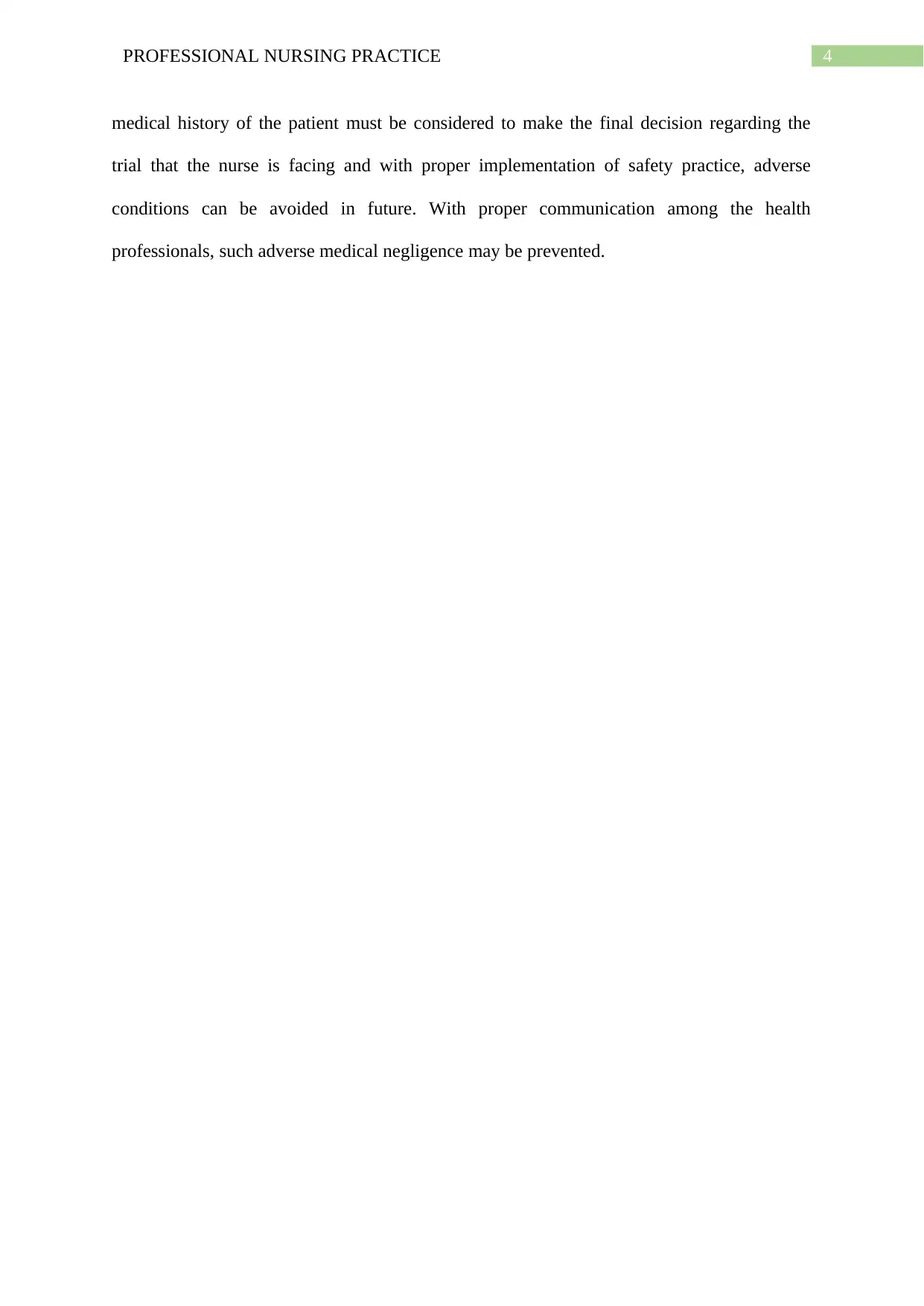
4PROFESSIONAL NURSING PRACTICE
medical history of the patient must be considered to make the final decision regarding the
trial that the nurse is facing and with proper implementation of safety practice, adverse
conditions can be avoided in future. With proper communication among the health
professionals, such adverse medical negligence may be prevented.
medical history of the patient must be considered to make the final decision regarding the
trial that the nurse is facing and with proper implementation of safety practice, adverse
conditions can be avoided in future. With proper communication among the health
professionals, such adverse medical negligence may be prevented.
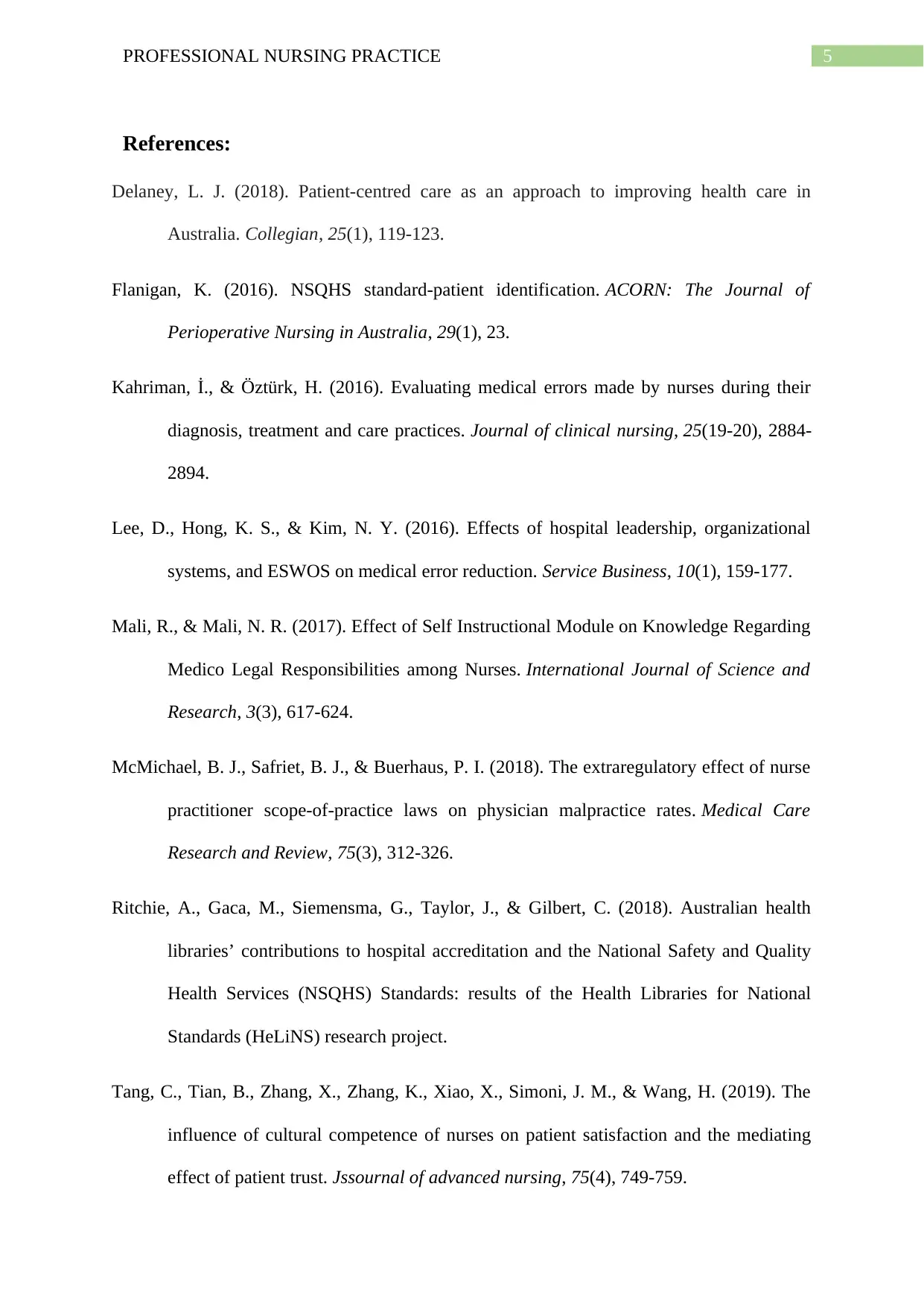
5PROFESSIONAL NURSING PRACTICE
References:
Delaney, L. J. (2018). Patient-centred care as an approach to improving health care in
Australia. Collegian, 25(1), 119-123.
Flanigan, K. (2016). NSQHS standard-patient identification. ACORN: The Journal of
Perioperative Nursing in Australia, 29(1), 23.
Kahriman, İ., & Öztürk, H. (2016). Evaluating medical errors made by nurses during their
diagnosis, treatment and care practices. Journal of clinical nursing, 25(19-20), 2884-
2894.
Lee, D., Hong, K. S., & Kim, N. Y. (2016). Effects of hospital leadership, organizational
systems, and ESWOS on medical error reduction. Service Business, 10(1), 159-177.
Mali, R., & Mali, N. R. (2017). Effect of Self Instructional Module on Knowledge Regarding
Medico Legal Responsibilities among Nurses. International Journal of Science and
Research, 3(3), 617-624.
McMichael, B. J., Safriet, B. J., & Buerhaus, P. I. (2018). The extraregulatory effect of nurse
practitioner scope-of-practice laws on physician malpractice rates. Medical Care
Research and Review, 75(3), 312-326.
Ritchie, A., Gaca, M., Siemensma, G., Taylor, J., & Gilbert, C. (2018). Australian health
libraries’ contributions to hospital accreditation and the National Safety and Quality
Health Services (NSQHS) Standards: results of the Health Libraries for National
Standards (HeLiNS) research project.
Tang, C., Tian, B., Zhang, X., Zhang, K., Xiao, X., Simoni, J. M., & Wang, H. (2019). The
influence of cultural competence of nurses on patient satisfaction and the mediating
effect of patient trust. Jssournal of advanced nursing, 75(4), 749-759.
References:
Delaney, L. J. (2018). Patient-centred care as an approach to improving health care in
Australia. Collegian, 25(1), 119-123.
Flanigan, K. (2016). NSQHS standard-patient identification. ACORN: The Journal of
Perioperative Nursing in Australia, 29(1), 23.
Kahriman, İ., & Öztürk, H. (2016). Evaluating medical errors made by nurses during their
diagnosis, treatment and care practices. Journal of clinical nursing, 25(19-20), 2884-
2894.
Lee, D., Hong, K. S., & Kim, N. Y. (2016). Effects of hospital leadership, organizational
systems, and ESWOS on medical error reduction. Service Business, 10(1), 159-177.
Mali, R., & Mali, N. R. (2017). Effect of Self Instructional Module on Knowledge Regarding
Medico Legal Responsibilities among Nurses. International Journal of Science and
Research, 3(3), 617-624.
McMichael, B. J., Safriet, B. J., & Buerhaus, P. I. (2018). The extraregulatory effect of nurse
practitioner scope-of-practice laws on physician malpractice rates. Medical Care
Research and Review, 75(3), 312-326.
Ritchie, A., Gaca, M., Siemensma, G., Taylor, J., & Gilbert, C. (2018). Australian health
libraries’ contributions to hospital accreditation and the National Safety and Quality
Health Services (NSQHS) Standards: results of the Health Libraries for National
Standards (HeLiNS) research project.
Tang, C., Tian, B., Zhang, X., Zhang, K., Xiao, X., Simoni, J. M., & Wang, H. (2019). The
influence of cultural competence of nurses on patient satisfaction and the mediating
effect of patient trust. Jssournal of advanced nursing, 75(4), 749-759.
⊘ This is a preview!⊘
Do you want full access?
Subscribe today to unlock all pages.

Trusted by 1+ million students worldwide
1 out of 6
Related Documents
Your All-in-One AI-Powered Toolkit for Academic Success.
+13062052269
info@desklib.com
Available 24*7 on WhatsApp / Email
![[object Object]](/_next/static/media/star-bottom.7253800d.svg)
Unlock your academic potential
Copyright © 2020–2026 A2Z Services. All Rights Reserved. Developed and managed by ZUCOL.





